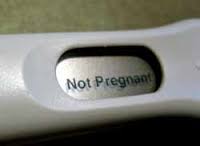For many women, the typical signs of pregnancy are when their period doesn't arrive on time, providing they've been active sexually. There are some factors that might conceal the pregnancy, even more than six weeks. Taking into consideration all the mental and physical changes that usually happen to expecting moms, it’s hard to believe how a woman couldn’t possibly know. Truth be told, the experience, called a cryptic pregnancy, isn’t so uncommon.
Can You Be Pregnant and Not Know It?
 As hard as it is to believe, it is sometimes possible that women carry a fetus all the way to delivery without ever knowing they are pregnant, and a cryptic pregnancy happens more often than you think. According to a German study, cryptic pregnancy occurs in one out of every 475 pregnancies until after the 20th week, and one out of every 7,255 learn their condition when going into labor.
As hard as it is to believe, it is sometimes possible that women carry a fetus all the way to delivery without ever knowing they are pregnant, and a cryptic pregnancy happens more often than you think. According to a German study, cryptic pregnancy occurs in one out of every 475 pregnancies until after the 20th week, and one out of every 7,255 learn their condition when going into labor.
Although most women experience the usual pregnancy-related symptoms such as weight gain, morning sickness, and missed periods, some women experience no symptoms at all, or such mild symptoms that they mistake or dismiss them for some other reason. In rare cases, women in their third trimester often make appointments to see a physician because they don’t feel well, only to find out the reason for their fatigue and upset stomach was pregnancy.
Possible Reasons You Are Not Aware of Your Pregnancy
Can you be pregnant and not know it? Yes, and there are two theories as to why women have cryptic pregnancies, meaning they aren’t aware they are pregnant. The first is that they deny the pregnancy, and the second is that their symptoms are not obvious.
1. Overweight or Obese
Some women who are obese or overweight aren’t necessarily aware of the typical physical changes of a fetus developing inside them, and the excess fat may insulate them from noticing the baby move or kick. It also bears noting that a woman who is overweight can often experience menstrual irregularities. This is because fat stored in the posterior and abdomen manufactures androstenedione, which is then turned into estrogen, throwing the hormones out of balance.
2. Hormonal Imbalance or Irregular Periods
If your periods are often irregular, you wouldn’t necessarily think that missed period equals pregnancy, and cryptic pregnancies sometimes occur in women who have a hormonal imbalance such as:
 Poly Cystic Ovarian Syndrome (PCOS).
Poly Cystic Ovarian Syndrome (PCOS).- You have a very low body fat ratio, causing a hormonal imbalance, such as female athletes.
- You’ve recently been pregnant, and your hormones haven’t gotten back to normal before getting pregnant again.
- You are still breastfeeding before getting pregnant again.
- You have recently used or are currently using a birth control that continually releases hormones into your body.
3. Pre-Existing Conditions
Can you be pregnant and not know it? Yes, it's possible. If you’re used to dealing with bloating, nausea, vomiting, and other stomach problems, you may write off an expanding belly and morning sickness as just another G.I. tract irritation. After a few months when it disappears, you think it’s over, you wouldn’t realize you had just passed your first trimester.
4. A Negative Pregnancy Test
 One way that a fetus makes their demands known is by releasing a hormone known as human chorionic gonadotropin (HCG). This hormone makes a home pregnancy test turn positive. Getting a false negative from a home pregnancy test is possible if a baby produces a scant amount of HCG and thus goes undetected by the mother. Other causes of false negative include;
One way that a fetus makes their demands known is by releasing a hormone known as human chorionic gonadotropin (HCG). This hormone makes a home pregnancy test turn positive. Getting a false negative from a home pregnancy test is possible if a baby produces a scant amount of HCG and thus goes undetected by the mother. Other causes of false negative include;
- Urinating on the test stick too early in the pregnancy, when your body isn’t producing enough of the hormone.
- You drink too many liquids before the test, causing the urine to be diluted.
- Not following the directions.
Always do another test as backup, and if it is still negative, and your period isn’t on time, and you detect other early pregnancy signs, have your doctor test you to be sure.
5. Peri-Menopause
Women in their mid to late 40's experience irregularities in their menstrual cycles known as peri-menopause periods, or a cycle that stops for several months before resuming again, and other changes such as moodiness, and weight gain. However, they are also indications that a baby is on the way.
6. No tell-Tale Symptoms
Some women are fortunate enough to not experience any tell-tale symptoms of early pregnancy, such as morning sickness, fatigue, food cravings, headaches, soreness, and back pain. In other cases, women can have light symptoms that are mistaken for other health issues, such as indigestion, food poisoning, or cramps. Furthermore, while it’s normal for the baby to start moving around and kicking in the second trimester, not all baby’s do. It’s possible that the baby is moving; however, because the placenta is in front of the baby, the woman doesn’t feel anything.
7. Stress
Stress can have an impact even if the woman doesn’t have a history of any mental conditions, and might be influenced by external stressors, such as relationship problems or financial difficulties. But can you be pregnant and not know it? Yes, extreme stress is known to be an indicator in some cases of miscarriage that goes undetected.
8. Inexperience
Young mothers, especially during the first pregnancy, are sometimes not aware of what they're feeling. They often overlook it, saying they're feeling gas pains, or attribute it to other everyday natural causes. In some cases, outright denial that they could be pregnant, may also delay very important prenatal care.
9. Psychiatric Issues
Women with mental health problems such as schizophrenia or bipolar disorder may not have the coping abilities to address their pregnancy, and therefore ignore it. Women with mental illness may believe something other than a baby, such as a blood clot or cancer, is growing inside.
10. Infertility
Although modern medicine has made it more predictable whether a woman has the ability to conceive or not, extensive tests and fertility experts are not always accurate. Many women who gave up hope long ago can suddenly discover they’re pregnant. And in some cases, an older woman may actually mistaken pregnancy symptoms as menopause.
